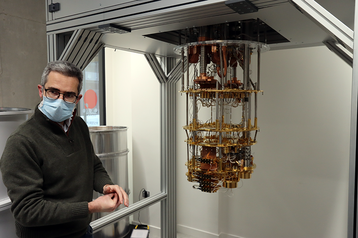UK quantum computing company Quantum Motion has raised £42 million ($50.8m) in an oversubscribed round.
The investment comes a week after room-temperature miniaturized quantum computing firm Quantum Brilliance raised $18m.
Quantum Motion's round was led by Bosch Ventures, who were joined by Porsche Automobil Holding SE (Porsche SE) and British Patient Capital.
All existing investors from earlier rounds (Oxford Science Enterprises, Inkef, Parkwalk Advisors, Octopus Ventures, IP Group and NSSIF) also participated.
The money will help Quantum Motion develop deeper ties with its manufacturing partners and treble the size of its central London headquarters.
"The support of leading technology investors enables us to realize our vision of a quantum computer built using standard foundry processes," CEO James Palles-Dimmock said.
"This support, along with the continuing UK national quantum program and European initiatives, provides a step-change in our capabilities. We have assembled a world leading team and with the funding and support in place, we are ready to scale and deliver on our vision.”
DCD visited the company last year, which hopes to develop quantum computers using traditional CMOS chips.
"Research from us and others over the past 10 years has shown that you can use similar kinds of structures with silicon and metal gates to trap individual electrons, and to use their magnetic state - their spin - as a qubit," CTO and co-founder Professor John Morton explained at the time.
"If you're really serious about developing this as a technology that can build a universal quantum computer, then you need to think about scale and error correction, and being able to get not just to tens, or even hundreds of qubits, but hundreds of thousands or millions of qubits."
Quantum Brilliance raises $18 million
Australian- and German-based Quantum Brilliance has a different approach. Unlike Quantum Motion, which needs its system to be cryogenically cooled, QB can operate at room temperature.
It uses synthetic diamonds and does not require cryogenics, vacuum systems, or precision laser arrays. This, the company claims, could mean that it could exist both in data centers, but also Edge devices, mobile phones, and autonomous vehicles.
QB hopes to miniaturize its technology to the size of semiconductor chips that can be used on any device and wherever classical computers exist today.
It raised $18m from Breakthrough Victoria, Main Sequence, Investible, Ultratech Capital, MA Financial, Jelix Ventures, Rampersand, and CM Equity.
The company will use the money to expand international operations, deliver hardware and software products to customers, and improve manufacturing and fabrication techniques.
“Our technology is following the successful path of classical computers, where integrated semiconductor chips allowed the jump from large fragile mainframes to laptops and smartphones. Our small form factor, room temperature, low power devices are forging the same path,” Andrew Horsley, co-founder and CTO of Quantum Brilliance, said. “We are proud of our achievement in taking quantum computing from the lab to the data center has been recognized by the investment community.”

